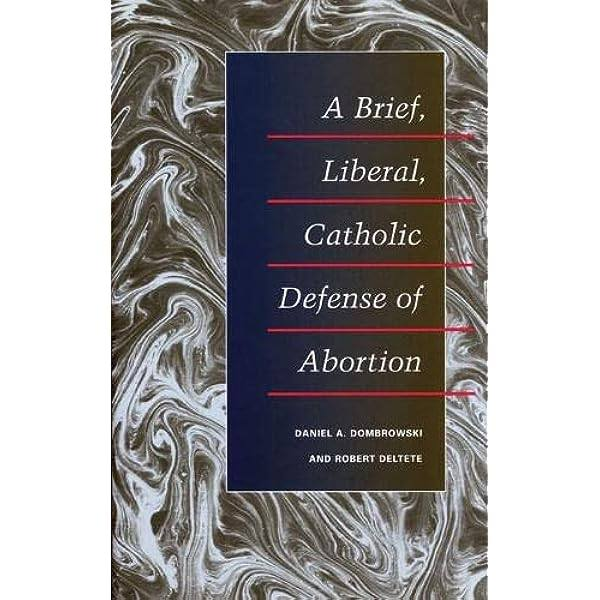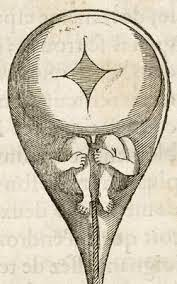I promised a review of this book two weeks ago. People are not kidding when they tell you retirement can be busy! I apologize for not getting to this sooner,
The book is A Liberal, Catholic Defense of Abortion, by Daniel A. Dombrowski and Robert J. Deltete, both professors of philosophy at Seattle University. Like myself, Dan Dombrowski is not only a Catholic philosopher but also a member of the process philosophy/theology community.
The authors argue that, particularly in Catholicism, abortion has been argued against in two ways. The first is the perversity view. This view finds its roots in Augustine, who argued that sexual intercourse is only for procreation. It is not meant for pleasure and should only be engaged in by married couples for the express purpose of conception. On this view, abortion is wrong for the same reason contraception is wrong, because it interrupts or interferes with God's purpose in giving us sexual intercourse as part of life. They cite James McCartney as saying that in essence, the perversity view implies that even if life did not begin at conception, abortion is wrong because it severs the tie between the sex act and its intended purpose.
Dombrowski and Deltete point out that it is very difficult to separate the Augustinian view from Augustine's own experience as a sexual libertine before he embraced the Christian faith. I think it is possible that Augustine lets his own experience unnecessarily cloud his theology here. (And I might ask if we modern-day philosophers and theologians and ethicists do the same. This is not a slam on Augustine as much as a level of understanding which may put what he said in a broader perspective.)
There are two things which stood out to me about their treatment of the perversity view. The first is that in essence, Augustine said that because sex is only for procreation, that if a couple enjoys intercourse, even if their only reason for doing it is procreation, they sin. I think that is a hideous view which flies against how God made things. It seems to me if God wanted people to not enjoy sex, God would have made things so sex was not enjoyable. But of course, if that is the case people would not be having sex, so there would not be much procreating going on. It befuddles me to base a view of sex on natural law, and then say sex should not be enjoyable, when sex is simply naturally enjoyable.
The second thing is an even bigger deal though. Augustine said that because sex was meant for procreation only, abortion is evil because it thwarts the purpose God has for sex, even if we do not know when life begins. Those versed in church history are aware that the Fathers debated when life begins, and were not of one mind about it. Both Augustine and Aquinas pondered this question in their writings, and neither of them had a definitive answer, even though they both tended toward ensoulment (the point at which human life begins) happening in the third trimester. In fact, Augustine suggested that for roughly the first trimester, the life of the fetus is more like vegetative life, and the second trimester like animal life, and the fetus does not approximate human life until the third trimester.
Dombrowski and Deltete reject the perversity view in favor of the more well-rounded view that God also intended intercourse as a means of intimacy, pleasure, and bonding within marriage.
The second view Dombrowski and Deltete discuss is an ontological view. This is the view that hominization, (when the fetus becomes human) occurs early in pregnancy, possibly even at conception. Both Augustine and Aquinas disagreed with this ontological view. Their opposition to abortion early in pregnancy could not have been based on an ontological view, for the simple reason that neither of them believed human life began early in pregnancy.
Augustine is writing in the 5th century, and Aquinas in the 13th. The ontological view has its roots in the scientific beliefs of the 17th century. The belief then was that at conception, the human being was totally present, not needing to develop, only to grow. In the 17th century, Dutch scientist Thomas Hartsoeker depicted this homunucleus like this:
This is what 17th century science thought the zygote looked like at conception. We now know that is not true. The modern version of this argument says because human DNA is present at conception, human life begins at conception. I discuss the flaws in that reasoning here. Dombrowski and Deltete then conclude the book with a discussion of why, given what modern science tells us, and given good philosophical reasoning on what modern science tells us, the idea that life begins at conception is not correct, which should give pause to those who adamantly oppose abortion on an ontological view. It is a serious philosophical mistake to base your position on information, and then continue to hold that view when it turns out the information is false.
I found this book a very worthwhile read. I am a pro-choice Catholic. I am an outlier in my faith community in this regard and others. I think the Catholic church is wrong on abortion, same-sex marriage, just war, and the role of women. (I fully support the ordination of women.)
My own view is to the left of Dombrowski and Deltete. I am opposed to placing any restrictions on abortion at any time, ever. The reason for this is simple. People do not wait until the third trimester to have an abortion because they do not want to have a baby. People who get third-trimester abortions do so because life and/or well-being of either mother or child is in danger. I believe that whenever life begins, and that is a question I cannot answer, the life of the born still carries more weight ontologically and morally than the life of the unborn. I oppose all restrictions on abortion at any time in the pregnancy, not because I think abortion is a positive good, but because many times it is the lesser of two evils.
And when those situations arise, where abortion is the lesser of two evils, I believe the mother, and only the mother has moral standing to make the decision. She may not make the right decision either way. She might have an abortion when she should not, or she might not have one when she should. That should not even matter to the law. Contrary to what Mehemet Oz says, no third party, no government entity, or religious institution, or medical practitioner can make this decision and possibly get it right. ONLY the mother can do that.
I saw the 2013 movie After Tiller. Dr. George Tiller was the late-term abortion provider who was shot and killed outside his Lutheran church in Wichita, KS. The film tracks four other providers who Tiller trained, and how their practices were doing. Someone in the pro-life group in my own Catholic parish sent out an e-mail asking people to call PBS and ask them not to show this awful movie (which this person had not seen, by the way.) When I get an e-mail like that, I am going to watch the movie for myself and formulate an opinion. What I saw was couples entering these abortion clinics, distraught because their baby either had died or could not survive birth. That resonated with me because my wife and I lost a child to fetal death.
What I observed was grieving couples and women, going to have a procedure they did not want to have, and the "pro-life" protesters outside spitting on them and cursing at them. Then they go inside and the staff welcomes, embraces and comforts them. I think the people on the inside were more Christlike than the people on the outside. I have basically denounced the so-called pro-life movement because they are so anti-life in their behavior, as if the end justifies the means.
You can see After Tiller here.
This book is a good suggestion for any thoughtful person who really wants to look at this issue in a morally balanced manner.



No comments:
Post a Comment